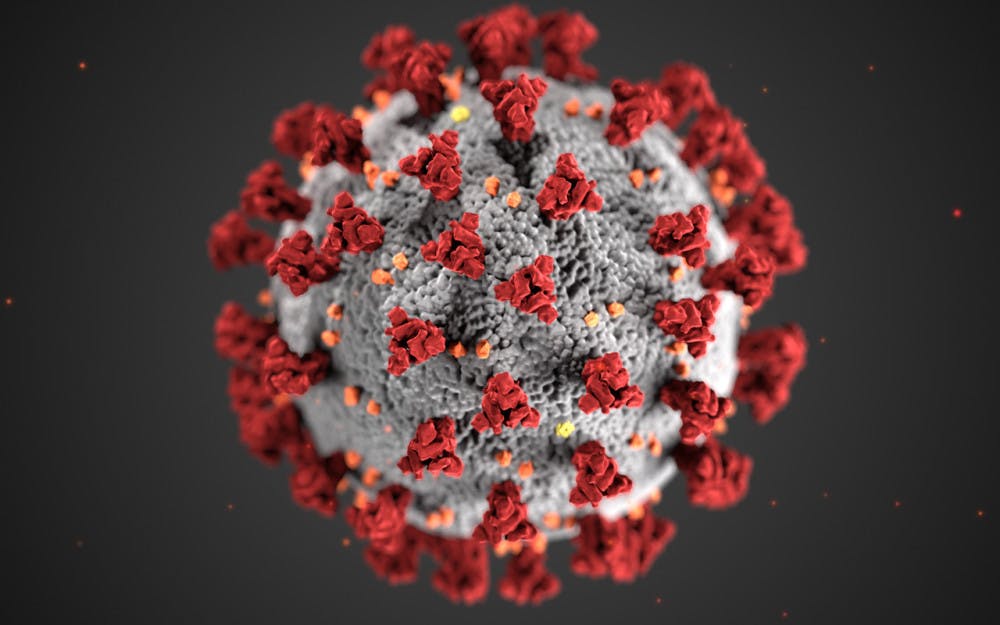The Florida Department of Health announced its second confirmed case of COVID-19 in Alachua County Thursday evening.
But the state department and the Alachua County Department of Health reported differently on the whether the patient is male or female.
The newest case is a 24-year-old who is known to have traveled to Europe recently, according to a press release from the state department. Paul Myers, administrator for Alachua County Department of Health, stated the patient is a male.
It’s currently unknown if they are a UF or Santa Fe College student.
The current number of positive cases in Florida is now 46, according to the New York Times.
Multiple people are being tested for the coronavirus in the county, local officials said in a press conference Wednesday afternoon. They would not give details on how many people are being tested, but said there is no shortage of lab tests.
The first case, a 68-year-old woman from Georgia, is under quarantine in the county, Myers said at Wednesday’s conference. Those who came in contact with her are also under quarantine, he said.
“There were a number of people who were exposed,” Myers said. “I’m very confident that we have identified most, if not all of them.”
The Georgia Department of Public Health is trying to determine where the woman with the coronavirus contracted the disease, along with where she traveled before coming to Florida, Myers said.
“I know where she went in Alachua County, and I know who her contacts are,” he said. “So the risk to this community is very low.”
While the county is continuing to focus on identifying and containing the virus, Myers said they are now trying to prevent it from spreading. This involves personal hygiene like washing hands and staying home when sick.
“These are all very important considerations to buy us time,” he said. “We have to buy time in order for a vaccine to be developed.”
But during this time, life marches on for Alachua residents, who are finding ways to keep clean and safe.

Mark Sexton, the Alachua County spokesperson, takes questions March 11 at a press conference at the Alachua County Emergency Operations Center regarding the COVID-19 outbreak.
Public schools stay open, but sanitize
Kathleen Solito begins her school day wiping down the desks in her classroom.
Gainesville High School teachers always have hand sanitizer and tissues available for students, said Solito, an English and research teacher. But in light of the coronavirus, the English department chair said she’s purchased more materials for her department.
Alachua County Public Schools doesn’t plan on closing its schools or transitioning to an online platform, said Jackie Johnson, the school board’s spokesperson. After consulting with the county health department, she said the school system decided to keep schools open because the risk of spreading the virus is considered low.
Johnson said their decision to not close schools is not unusual, as most school districts in Florida haven’t closed schools yet.
“If someone tells us we need to close schools, we will close schools,” Johnson said.
The district has some worries about making schools fully online because some students rely on it for their meals or don’t have access to computers or the internet at home, Johnson said.
The school district is taking small preventative measures, such as enacting flu season cleaning protocols and ensuring school nurses continue to be proactive in sending home students with fevers or coughs, she said.
Teachers are educating students on proper handwashing techniques and telling them how to handle coughs and sneezes while avoiding touching their faces, Johnson said.
Although schools haven’t closed down, that hasn’t stopped teachers from talking and students from hoping, Solito said.
“It’s funny,” she said. “I don't think they (students) seem very fearful.”
James Donnelly, a 17-year-old Eastside High School senior, said when he walks down the halls, the atmosphere is overwhelmingly calm, despite the few students wearing surgical masks.
He said he sees students compulsively wipe down their desks and clean their hands with disinfectant. Yet most are calm and collected, only fearful of putting others in danger.
“I would have expected more of an outcry,” Donnelly said.
Homeless shelters double down on cleaning
Local homeless shelters are making sure their occupants are taken care of in response to coronavirus.
The St. Francis House, located at 413 S Main St., has come up with a preventative plan, said Katelyn Drummet, the shelter’s volunteer and communications manager. If someone at the shelter gets the virus, she said they will be referred to the health department.
“We’re still here to serve the homeless, and we are doing that,” Drummet said.
The shelter is operating normally, she said. While no one at the shelter has shown any symptoms of the virus, they are monitoring occupants for difficulty breathing, persistent pain in the chest, confusion and seizures.
Drummet said the shelter has had to cut into its regular funding from the city and county to purchase supplies such as soap, alcohol-based hand sanitizers, tissues, trash baskets and disposable face masks. Work areas will be disinfected before, during and after shifts using wipes or rags soaked with cold water and bleach, she said.
Everyone in the shelter is responsible for washing their hands frequently, using hand sanitizer with at least 60 percent alcohol and covering coughs and sneezes with tissues or the inside of their elbow, she added.
“We’re just playing it by ear with how this is going,” Drummet said.
Local businesses stock up on cleaning products
Businesses in Gainesville have responded to the spread of the virus by making changes to their usual routines.
On March 4, Starbucks paused their use of personal cups “indefinitely”. According to a Starbucks press release, they plan to continue honoring the 10-cent discount for anyone who brings in their own cup but will not serve drinks in personal cups.
Publix is also making changes due to an increase in demand for cleaning products, said Maria Brous, the supermarket’s spokesperson.
Customers will be limited to purchasing two of each item when buying hand soaps and sanitizers, rubbing alcohol, facial masks, gloves, disinfectant wipes and sprays, aerosol disinfectant sprays, facial tissues, bleach, cups, plates and utensils.
The limits were implemented company-wide on March 6 and are in place until further notice, Brous said.
In addition to limiting purchases, Brous said the supermarket is working to restock items as quickly as possible.
Rachel Edwards, who frequents the Starbucks at Library West, thinks pausing the use of personal cups is a good idea to prevent contamination of the store’s equipment.
“It’s smart because everyone treats their own cups differently, and Starbucks has no way of knowing how clean someone’s cup is,” the 19-year-old UF political science freshman said.
Asian restaurants struggle with low business
As fears for the coronavirus rev up, sales for local restaurants have slowed down.
Asian restaurants might be taking a larger dip in sales than others. Because the coronavirus originated in China, there has been a rise in social concerns ofcustomers avoiding restaurants serving Asian cuisine.
Ming Wang, manager of Gator Suyaki on SW 13th St., said she has seen her sales decrease by about 35 percent since the end of January.
“A lot of people don’t want to go out to eat,” she said.
Wang said she’s unsure when business will return to normal. However, she believes encouraging takeout meals might help bring more business back.
On the other hand, James Lai, manager of Asian Wok & Grill on SW 35th Blvd., doesn’t think the drop in business will last long.
He estimates the number of customers they’ve received has decreased by about 70 percent since late January.
While the restaurant hasn’t taken additional safety measures, he does recognize that some customers may worry that Asians may have recently travelled to a highly affected country.
Lai said customers in the past month have told him to wash his hands before handling their food, even though that’s already being done. He said he thinks the fear is irrational.
Lai said his restaurant would likely only close if the coronavirus cases in the county increased dramatically.
“I'm sure we'll recuperate once this entire pandemic passes over,” he said.
Public transportation faces criticism for alleged failure to sanitize
Despite coronavirus precautions from other parts of the city, a public transit operator feels the city is falling short in its role to protect residents.
Transit operators haven’t been provided training or sanitation supplies, and the buses aren't being cleaned during the day to kill the virus, an RTS driver, who The Alligator granted anonymity to for fear of repercussions, wrote in an email.
“Unfortunately, the main transportation for students and residents is taking no action to sanitize, clean, and limit exposure,” the driver wrote.
The virus can live on surfaces made from a variety of materials for days, according to the CDC.
However, the city’s spokesperson Rossana Passaniti wrote in an email that the city is “proactively working” to help stop the spread of COVID-19, ensuring that each bus in service is cleaned with industrial strength products daily.
When asked if transit operators have been provided training or sanitization supplies, Passaniti didn’t answer directly. Instead, she wrote that RTS drivers are “regularly updated” about the daily cleaning of the buses and upcoming sanitation protocols.
“We’re working with UF during this evolving situation to best meet the transportation needs of students, faculty and staff,” Passaniti wrote.
The Centers for Disease Control and Prevention advises residents to take preventative action by washing their hands often with soap and water for at least 20 seconds, avoiding touching your face, avoiding contact with sick people, cleaning your surrounding surfaces, staying home when you are sick and covering your cough or sneeze with a tissue.
If you believe you have the virus, the Alachua County Department of Health is asking to contact them before going to any physicians office, emergency department, hospital or urgent care.
The department can be contacted during the business hours of 8 a.m. to 5 p.m. at 352-225-4181 and after hours at 352-334-7900.
Samantha Chery, Grethel Aguila, Sarah Mandile, AJ Bafer, Alex De Luca and Stephany Matat contributed to this report.
Coronavirus Disease 2019 (COVID-19)






